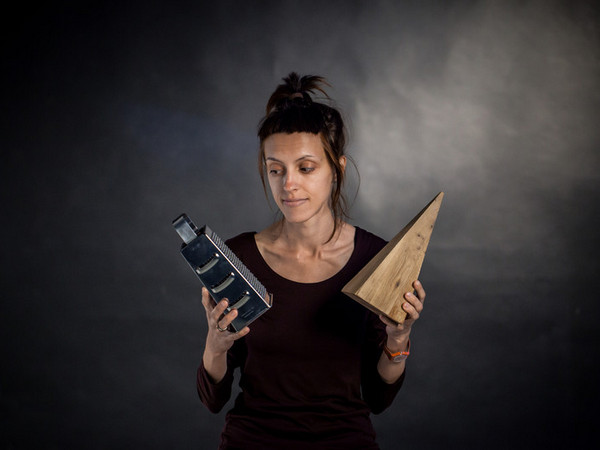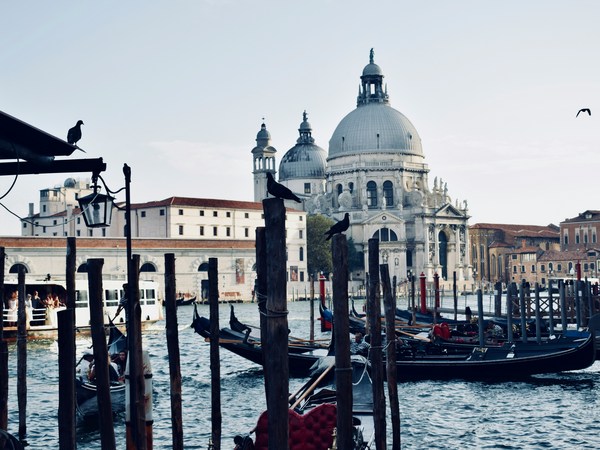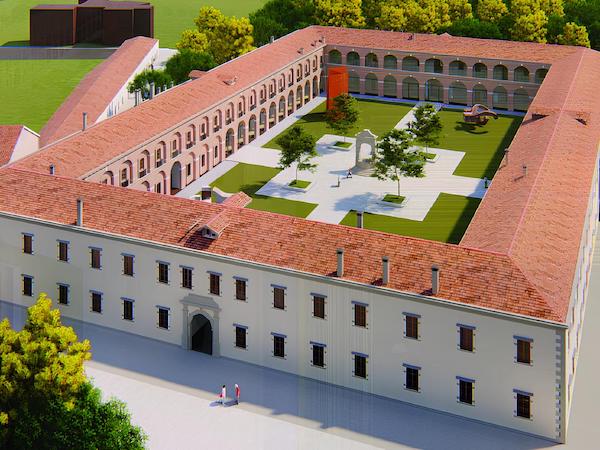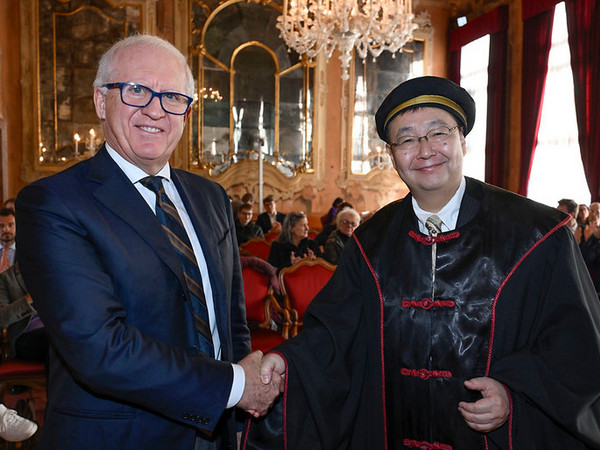The short film Dcera - Daughter (Czech Republic, 2019, 14'44") by Daria Kashcheeva, produced by FAMU - Film and TV School of the Prague Academy of Performing Arts, is the winner of the International Competition of the 10th edition of Ca' Foscari Short Film Festival, the first festival in Europe entirely organized and managed by a university, which for the first time this year has gone “large-scale” throughout the city of Venice, with screenings held, as well as at the historical Auditorium Santa Margherita, also at: the Ugo and Olga Levi Foundation , the Centro Candiani in Venice, the Querini Stampalia Foundation, the Giorgio Franchetti Gallery at Ca’ D'Oro, the Palazzo Grimani Museum, the National Archaeological Museum, the Bevilacqua La Masa Foundation, the European Council of Art In Paradiso Art Gallery and the NH Venezia Rio Novo Hotel.
The closing ceremony of the 10th edition of the Ca’ Foscari Short Film Festival was inaugurated by the new rector of Ca' Foscari University of Venice, Tiziana Lippiello, who first of all congratulated all the staff - and in particular the Ca’ Foscari student volunteers. - for their efforts towards the success of this 10th edition, despite the adverse circumstances. Thanks could only go to the nine partner institutions that allowed the Short Film Festival to 'occupy' all of Venice, in a veritable joint effort to promote culture in the lagoon city.
It was then time for one of the most anticipated moments of the event, with the prestigious Ca’ Foscari Honorary Fellowship awarded by the rector herself to Dario Argento. The 'master of horror' attended the ceremony via videoconference, talking with the festival director Roberta Novielli and emphasizing above all the importance of daring, whether it be with the camera, with the stories (“that the critics initially thought were rubbish”), with music or colours. In a festival featuring a host of young directors, Argento stressed the need always to keep alive the desire to learn and to tell, advising them to gather a lot of experience and, above all, a lot of experiences, as he did with music, film criticism, screenplay, etc. ... Argento closed with the small regret of never having managed to shoot in Venice, which remains one of the cities closest to his heart.
THE AWARDS
The International Jury, composed of the Japanese-born Italian actress, Jun Ichikawa, the Syrian animator and video artist resident in Germany, Sulafa Hijazi, and the Polish actress Maria Mamona, awarded the prizes of the International Competition. The First Prize, the Levi Award and the Prize for the Music Video Competition consist of prestigious artistic sculptures in Murano glass designed and created by the master glassmaker Alessandro Mandruzzato.
The First Prize for the best short film of the Competition, announced by the juror Maria Mamona, went to Dcera - Daughter by Daria Kashcheeva with the following motivation:
An extremely touching and moving film, intensely creative, with a wonderful cinematic language. Through a simple story, without dialogue or words, the film takes us on an introspective journey that reflects the complex relationship between father and daughter.
Daughter is an animated work that tells of the difficult relationship between a daughter and her father. The scene opens with the girl, now grown up, at her father’s bedside, while she cradles her painful remorse, recalling the memories of a childhood marked by an unhappy relationship with her parent, characterised by ever increasing bitterness due to mutual incomprehension and inability to show affection. The work was made in stop motion by Czech director Daria Kashcheeva, already nominated for an Oscar for this short film, and who thanked the jury and the audience with a video message. For Daughter, the young woman created the characters in painted papier mache, a material that allowed her to establish a surprisingly expressive silent dialogue between the characters through mimicry. In fact, the short film tries to express through this effective technique, and without the use of words, the drama of lost time and the compelling theme of the need to understand and forgive.
The Jury also awarded the Volumina Special Mention, for the work that offers the best contribution to cinema as art, to the Belgian short film Mother's (Belgium, 2019, 20') by Hippolyte Leibovici from the Institut National Supérieur des Arts. The award, delivered by the juror Sulafa Hijazi, consists of a prestigious photographic book on cinema produced by Volumina and a plaque. The work was awarded with the motivation:
Faces, mirrors in a dressing room, the characters confide in each other elements of their private life during a make-up session, showing us the beautiful fragility of the human being. And in the end they amaze us with an exceptional performance.
In Mother's, director Hippolyte Leibovici - who thanked the festival with a hilarious video message - softly opens a window on the lives of drag queens and their art: frank, authentic and crudely real, the four protagonists show themselves in full freedom, while the documentary shoots them in the dressing room, whilst they are preparing for the show. Thus, the film touches on issues such as identity and generational differences, a very strong element of division even within the LGBT community. At the centre of the picture, there is a "mother", like all mothers not always understanding or understood, but firmly rooted in her role as protector.
The Levi Award for the best musical score (music, speech, noise), offered by the Ugo and Olga Levi Foundation and assigned by a special jury, composed of Roberto Calabretto, Paolo Troncon, Daniele Furlati and Marco Tutino, went to the Estonian Värvid Must-Valgel - Black and White Colours (Estonia, 2019, 17'58"), produced by BFM - Baltic Film, Media, Arts and Communication School directed by German Golub. The award, presented by the Director of the Levi Foundation, Giorgio Busetto, was awarded with the following motivation:
The film uses a soundtrack strongly characterized by "contemporary" music that perfectly matches the characteristics of the story, underlining the mental instability of the protagonist. Excellent orchestral work and, in particular, the use of the dissonant strings that emphasize the confusion of the protagonist.
Telling the story of the transition from black and white to colour television in the 1970s, Black and White Colours focuses on the news anchor, a veteran of the small screen who cannot accept the inexorable fading of her youth. To the notes of a soundtrack dominated by violins, skilfully combined with alienating diegetic sounds, the psychological breakdown of the protagonist becomes more and more palpable and the boundary between illusion and reality increasingly blurred.
The “Pateh Sabally” Award, offered by the Municipal Authority of Venice, Murano, Burano and dedicated to the memory of the boy from Gambia who tragically died in the waters of the Grand Canal in January 2017, was awarded to Therese (Switzerland, 2019, 29') by the German-Brazilian director Fabiana Serpa of ZHdK - Zurich University of the Arts, which tells the story of the journey of female emancipation. It was 1888 when Therese, a botanist of Bavarian origin, set off for an expedition to Brazil. Soon the young woman will have to deal with the hostile attitude of the local guide who, unaware of the woman's noble origins, refuses to follow her orders. Inspired by the story of Princess Theresa of Bavaria, the work explores themes such as women's independence and gender equality. Indeed, thanks to her determination, Therese successfully asserts her rights in spite of the hostilities and cultural conflict. The award was presented by Giovanni Andrea Martini and Marco Borghi for the Municipal Authority of Venice, Murano and Burano with the following motivation:
A film that successfully identifies a fragment of late 19th century history to demonstrate how women, even if anchored in an important history of family tradition, can take up and win the challenge of equality and equal rights for all.
It was then time for thewinners of the 7th edition of the “Olga Brunner Levi” Award established by the Ugo and Olga Levi Foundation in collaboration with the Ca’ Foscari Short Film Festival. The award is dedicated to the best short film made by secondary school students from all over the world, on the subject of female musical performance or the relationship between female status and music in history. A jury made up of Roberto Calabretto, Cosetta Saba and Marco Fedarlo declared the winner Hed - Echo (Israel, 2019, 3'19") by the young Israeli Eli Bleier from Zomer High School, a stop motion animation work that, inspired by Haruki Murakami, addresses the theme of loss and the subsequent rediscovery of hopeful glimpses of light through painful memories. The award was presented by Giorgio Busetto, President of the Levi Foundation, with the following motivation:
Very interesting for its intertextual, literary and artistic cinematographic aesthetic modulation. Excellent use of the stop motion technique to express the soul of the young lost sister. The use of the original language (Hebrew) is also effective for attuning to the intimate thoughts we receive from the protagonist through the expedient of voice over. The soundtrack is also excellent.
Finally, the winner of the 4th edition of the Music Video Competition was announced, a competition dedicated to music video clips made by film or university students from all over the world. The winner was MTV is My Friend (Romania, 2019, 8'33”) by the Moldovan Radu Popovici, from West University Timișoara. The President of the Bevilacqua La Masa Foundation,Bruno Bernardi, awarded the prize with the following motivation:
Attention to detail and artistic taste. A video clip to be appreciated for its content, style, plot and production. The transitions are well done, a great mix of emotions.
A faithful transposition into images of the text of the song by the Romanian rock band Sarmale Reci tells the story of Cristi, a young man who cannot find meaning in his solitary and depressing life, ending up just one step from suicide. Music will save and give meaning to his existence, becoming a tool of escape from everyday life and a travel companion that carries him beyond reality through imagination.
The closing ceremony of the Festival was then enriched by the performance created by Igor Imhoff, who sought to pay homage to the great filmmaker Federico Fellini on the occasion of the centenary of his birth. The artist's goal was to highlight the director's eclecticism through a multimedia and interactive performance: starting from the images of some of the Maestro's best-loved films, Imhoff integrated the live interpretation by the actor Marco Tonino with an animated background, enabling the interaction of the real and the virtual, while the images were accompanied by reinterpretations of the typical sounds of Fellini's films by Davide Tiso.
To conclude the evening, instead of the classic goodbye by all the volunteers from the stage of the Auditorium, a video was projected with a rapid montage of the faces of all the students who with enthusiasm and dedication made the festival such a success again this year. Finally, after the usual thanks, the director Roberta Novielli announced the date of the 11th edition of the Ca’ Foscari Short Film Festival, to be held from 24 to 27 March 2021.
Relive the closing ceremony: https://www.youtube.com/watch?v=LlcoF1z69RY











